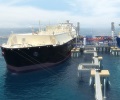

An ongoing force majeure on El Paso Natural Gas continues to limit westbound flows from the Permian Basin this month. The now weekslong maintenance is keeping pressure on West Texas production and continues to pose a risk to spot and forward gas prices in the US Southwest.
On Aug. 15, El Paso declared a force majeure on its Line 2000 near Coolidge, Arizona, after a segment of the pipeline suffered a failure. As El Paso works to repair the line, capacity through the Cimarron compressor station has been reduced to zero, down from its fully operational 567 MMcf/d.
The continuing outage on El Paso — a key transmission pipeline for Permian gas moving westbound — has restricted supply delivered to the Southwestern gas markets over the past month. From Aug. 15 to date, total westbound flows from the Permian Basin have averaged just over 3 Bcf/d, down from an average 3.45 Bcf/d in the month prior to the force majeure, S&P Global Platts Analytics data shows.
The maintenance has also put pressure on Permian output. In September, West Texas production has averaged about 12 Bcf/d, down 250 MMcf/d, or about 2%, compared with the month prior to the maintenance.
Recently added eastbound transmission capacity on the 2 Bcf/d Whistler Pipeline has helped to alleviate more severe production impacts in West Texas. While flows on the intrastate line are not publicly reported, implied data compiled by Platts Analytics suggests that overall eastbound transmissions from the Permian are up about 200 to 250 MMcf/d as volumes are rerouted in response to the El Paso maintenance.
Price volatility
In the US Southwest, the drop in Permian supply over the past month has left the market more vulnerable to price volatility — particularly during exacerbating maintenance events or hot weather.
On Sept. 9, as extreme heat swept across the US Southwest, shipper and end-user demand for gas delivered on El Paso’s pipeline spiked, with total receipts exceeding scheduled volumes. The incident caused a precipitous drop in pipeline pressure, temporarily limiting receipt availability at several points.
Combined with elevated demand, the cut in supply from El Paso resulted in price spikes across the Southwest. El Paso Mainline spot gas briefly traded as high as $35, SoCal Gas city-gates at more than $20 and Kern River, delivered, at upward of $15/MMBtu, S&P Global Platts data shows.
As the autumn season brings cooler temperatures to the Southwest, the region’s vulnerability to price spikes is likely to abate some in the weeks ahead. Still, the early September incident underscores the Southwestern gas market’s now tightly balanced supply situation.
Entering the late fall and early winter season, an uptick in heating demand could fuel more spot-market volatility in the Southwest, assuming El Paso’s maintenance work and capacity restrictions endure.
Over the past month, a run-up in winter forwards prices across the Southwest has likely been fueled, at least in part, by growing alarm over the potential for supply disruptions during the balance of injection season and leading into the colder months.
At SoCal Gas city-gate, the January forward contract has jumped to over $12.60 from the mid-$7s/MMBtu. At Kern River, delivered, January forwards are now trading around $9, compared with low-$5s/MMBtu in mid-August. At El Paso San Juan, prices for the peak-winter month have strengthened to $6 recently from the low-$4s/MMBtu, S&P Global Platts M2MS data shows.
Source: Platts